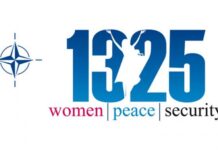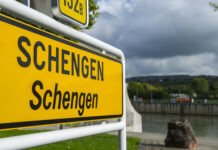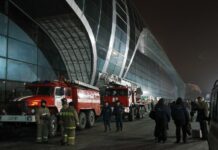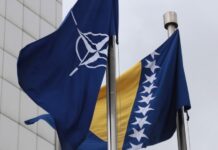Support of BiH Air Force to Civil Institutions
{gallery}newsletters/4/4{/gallery} To support a small air show organized by the Air Club “Krila” from Dobrinja, and to mark 8th June – the Novi Grad Sarajevo Municipality Day, the Air Force and Air Defense Brigade of the BiH Armed Forces provide its Mi-8 MTV-1 helicopter as a platform for parachute jumps.
Although air shows represent very popular tool to promote technical culture and pilot profession, this was the first air show in the BiH capital since the end of the war. All day, the inhabitants of the Novi Grad Sarajevo Municipality had an opportunity to enjoy jumps of the sports parachutes from the military helicopter whose landing target was the center in the field of a small stadium of the Olimpik Football Club in the Otoka settlement. In addition, balloons and ultra-light planes fans had their chance to enjoy.
For the pilots of the BiH Air Force, this was a small, but welcome exercise of parachute “assault”. The pilots of Mi-8/Mi-17 transport helicopters were pleased when, in 2008, five helicopters of this type, which belong to the BiH Armed Forces (OSBiH), were overhauled and modernized. Following the international tender, the BiH Ministry of Defense (MOBiH) contracted the Ukrainian company Ukrspetsexport from Kiev in 2006 to overhaul the aircraft, which was done at the Air Institute AVIAKON in Konotop, Ukraine.
The overhaul and modernization were done on two Mil Mi-8 MTV-1 Hip-H helicopters and sole Mi-17 from Rajlovac Heliport, as well as on two older Mi-8T Hip-C from Zalužani Heliport near Banja Luka. After the overhaul, these machines are able to fly 1,500 additional hours in the next10 years. Two Mi-8 MTV-1 helicopters were modernized according to standards of the International Civil Aviation Organization (ICAO), and they are now compatible with NATO standards. The Mi-17 helicopter is adjusted as lounge for VIP transport, while Mi-8Ts are intended for cargo loads in harsh meteorological conditions all over BiH.
BiH military pilots fly 30 hours per year on average. NATO standard is 180 hours annually, while transitional countries struggle to achieve at least 80 hours a year.
A. P.







